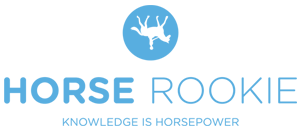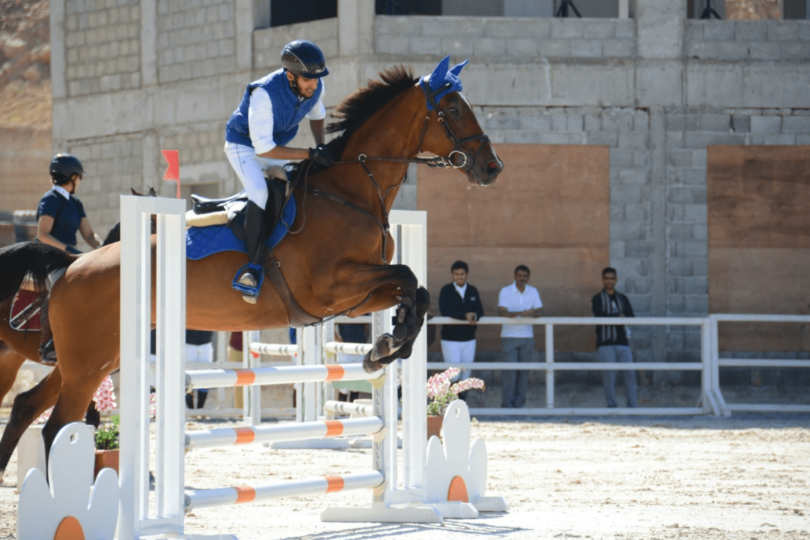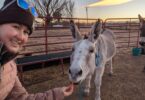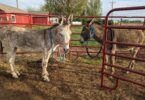Check your fears at the barn door — for good
In the early days of my riding journey, I used to be so nervous before and during my lessons. I worried about what my trainer would think of me, whether I’d put the saddle and bridle on correctly, how my horse would act, whether my mount would spook at invisible monsters, and so on.
Many things can go wrong when riding, and my brain liked to add all these fears add up to the point of overwhelm. This was especially true whenever I got back on after a fall or a big mistake.
Managing your nerves during horseback riding lessons is a challenge all equestrians face at some point. But there are several tactics that help the butterflies in your stomach settle down, including:
- Remember WHY You’re Doing This
- Be Positive, Not Naïve
- Internalize Your Wins
- When Things Do Go Wrong
- Study Yourself
- Shine, Baby, Shine!
When it comes to riding nerves, I trend toward the extreme. I am a super sensitive, analytical person (read: over-thinking spazz brain). That said, I’ve learned how to overcome my fears and get my head and heart back into the game.
I want to help you do the same by managing you mind and emotions during your lessons, but this advice can apply to working with your horse alone, going to a show, riding the trails, or any other activity.
New to lessons? Check out the 13 Best Horseback Riding Boots for Lessons.
Remember WHY You’re Doing This
Why do you spend time around horses? Is it a passion of yours? Do you want to continue to be around horses? If so, why is that?
Unless there are enjoyable aspects of being around horses, you wouldn’t be interacting with them in the first place. If you’re taking lessons, there is something inside you that wants to be around horses.
Either this desire to continue to be around horses will win, or the fear will win.
Recalling why you want to be around horses will help the fear to fade to the background.
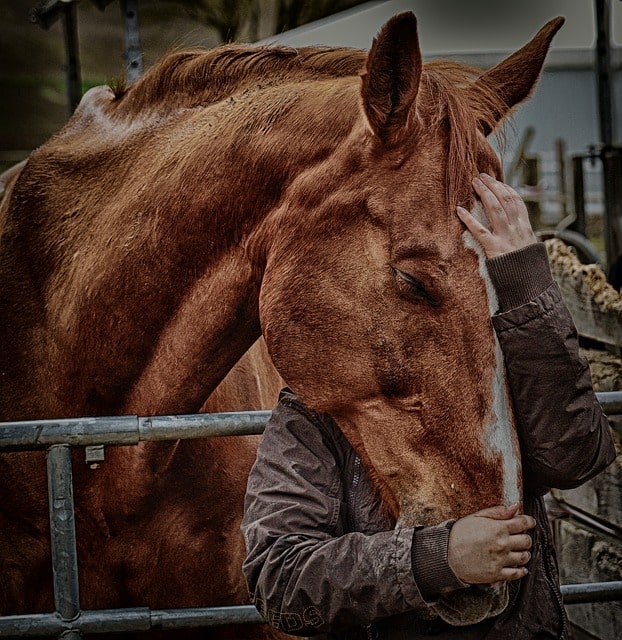
Photo Credit: Pixabay
Be Positive, Not Naïve
Let me be clear – being positive isn’t the same as being naïve. Take safety precautions, and be mindful of both your weaknesses and your horse’s issues. Good instructors give their pupils a plan in the case of a horse spooking or bucking from day one, including some methods to get a horse back under control or doing an emergency dismount.
Despite modeling safety best practices, the best trainers also convey a constructively positive attitude toward students and horses.
Go in expecting the best, with a contingency plan for the worst-case scenario.
When you go into your lesson with confidence, your horse will pick up on it and be more relaxed. Horses can sense when you seem to have the situation under control.
Internalize Your Wins
When you’re in the lesson, observe what goes well. When you expect that you and your horse will do a good job, you’ll notice more things that you are accomplishing together. Outcomes may not look exactly as you intended, but the victories will be there if you’re in the mindset to notice them.
Replay victories in your mind, and try to pinpoint exactly why each great outcome occurred.
By internalizing positive experiences, you will learn how to repeat and further improve your results. Focusing on past accomplishments will also communicate reassurance to your horse during future rides.
 When Things Do Go Wrong
When Things Do Go Wrong
Let’s face it, no amount of positive thinking, planning, or anticipating can prevent things from going haywire from time to time. The thought pattern explained above will help you go into a lesson with confidence and improve your experiences with horses over time.
But the reason we lose our nerve in the first place is that sometimes things don’t go as planned. Our horses spook. They get confused. They might trip after a fence or give you an attitude when you put your leg on. Other times, we can’t seem to figure out what our trainer is asking of us or what our horse is trying to tell us.
Or, no matter how hard we try in the moment, we just feel ‘off.’
In these instances, we have the opportunity to really shine. As I said before, you want to expect the best but have a plan for the worst-case scenario. You have already primed your brain with a patterned plan before the issue occurs. At the very least, your brain will have access to productive information about how you want to respond. Your body will likely still tense up and your mind may momentarily go blank, but you will be far more prepared to deal with adverse events.
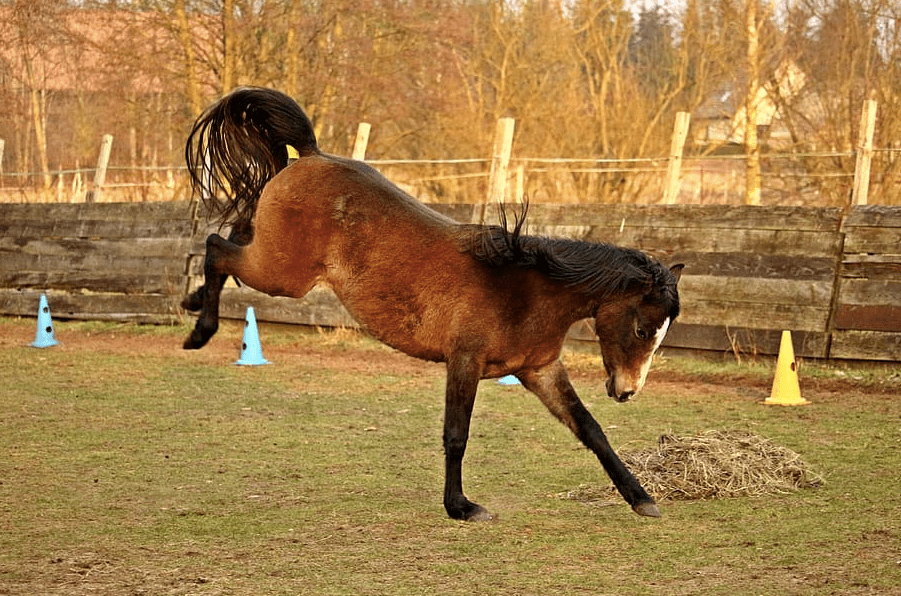
Photo Credit: Pxfuel
Pinching your pennies? Learn 3 Creative Ways to Afford Horseback Riding Lessons.
Study Yourself
It may sound weird, but it’s time to become an expert… on yourself! During down time between lessons, take notice of when you tense up in day-to-day life. What happens in your body? Where are you tense? How are you breathing?
Then, focus on taking deep breaths and relaxing those muscles immediately. Some people find it helpful to associate a word with their panic to help them relax (ex: “quiet”, “you’re okay”, “easy”). These moments are likely less threatening than the imminent danger of being on a thousand-pound animal, so it’s a perfect opportunity to master your mindset.
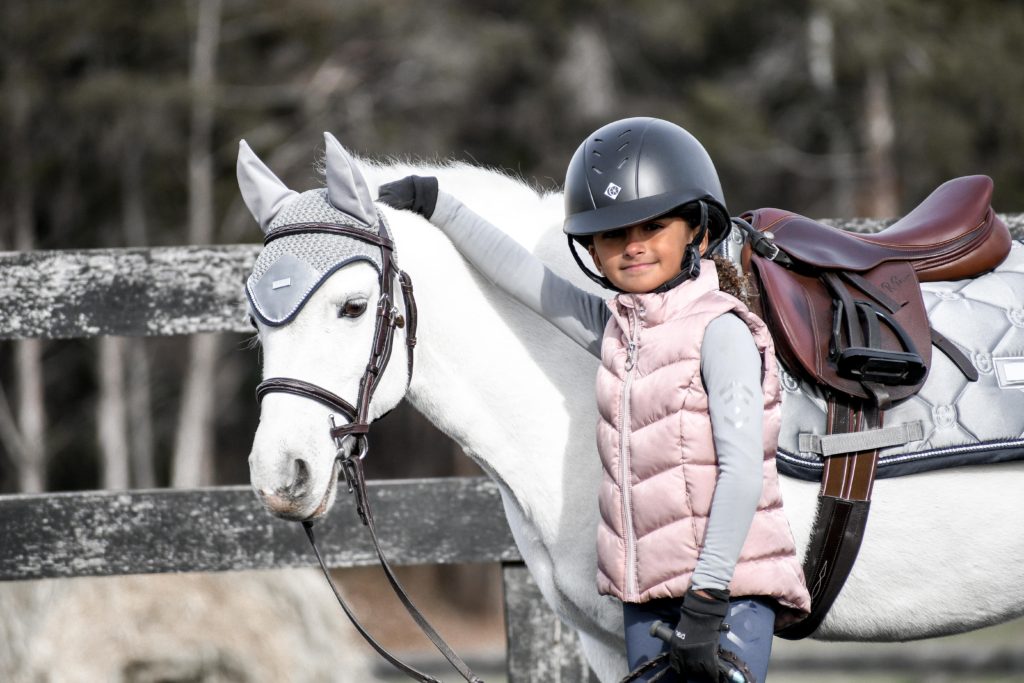
Credit: Johanna & Bunny
Learning to relax your mind and body in easier situations is good practice for the riding arena.
The next time you feel nervous while riding, you will be able to quickly respond in a productive way, as opposed to reacting in fear. Recognize as soon as your body tenses, take a deep breath, and look at your situation impartially.
The calmer you become, the more control you gain over any situation.
Shine, Baby, Shine!
Hard moments often teach us the most as riders. Of course, we want our lessons to go well and be able to make progress. But if (okay, when) things don’t go as planned, take inventory of what went wrong, what you may have done to contribute to the issue, and focus on how you can help your horse through it.
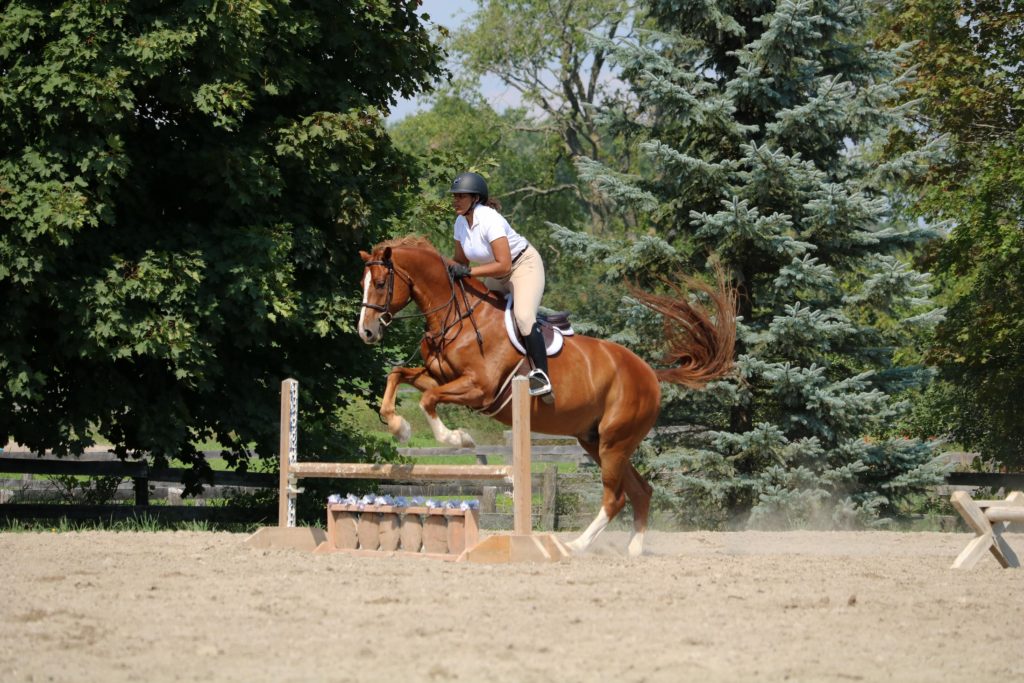
Photo Credit: Mya Brathwaite
With that information, make a new plan — even in the middle of the lesson. Discuss it with your trainer or trusted friends. Regroup, start fresh, learn, and be ready to celebrate the victories that come from this learning moment.
Frequently Asked Questions
My horse makes me nervous. Now what?
First, you should understand that what you feel is normal and understandable. Horses can be pretty scary if you feel anxious. If you are noticing that your fear is getting in the way of something you used to find enjoyable, you should take a step back and seek out help. The type of help you need will depend entirely on your own particular situation.
You may choose to start working with a good trainer, or switch trainers if yours isn’t a good fit. You can try meditation, deep breathing, or talk therapy. You can also take a few steps back and build your confidence up in smaller steps.
If you are nervous, because of your horse’s past behaviors, you can get another rider to try and work some kinks out or try riding a “confidence builder” type of horse for a while. Don’t be embarrassed to go back to something you feel comfortable with or just take a break, but sometimes pushing yourself out of your comfort zone is exactly what your brain needs to break the nervous cycle.
How do you calm your nerves before riding a horse?
There are a few ways you can try to relax before riding a horse. Many people swear by meditation and deep breathing, while others recommend herbal teas or supplements! Having someone help you with what’s making you nervous can be a game changer, whether it’s just a friend on the ground or a professional trainer.
If mounting a horse makes you nervous because of a fear they will move and cause you to fall, have someone hold the horse for you. If your horse is doing things that make you anxious you should focus on training, though, and not find cheap workarounds. In our mounting situation a horse that starts to walk as soon as your foot goes in the stirrup is dangerous and, frankly, rude, so it’s no wonder you’re nervous!
Work on training that horse to stand until you ask them to move. The same goes for other behavioral issues – work on training and your confidence will grow.
How do you prepare for horse riding lessons?
If you’ve never ridden a horse before there is not much to really “prepare” for other than make sure you have the right pants and shoes, wear a helmet, and communicate with your instructor. This communication is going to be key for you to make any progress, whether it’s just your riding skill or your anxiety.
If you feel that you have considerable anxiety, you should notify your teacher so that they can help you work through the problems. If you’re nervous about being in a group lesson, or just incredibly nervous about riding, you might need to switch to private lessons for more one-on-one time. If you speak with your instructor about your concerns, they should be able to help you overcome your fears and ride with confidence!
Why does horse riding feel scary?
Horse riding feels scary because it is risky. Granted, some people can jump on and gallop away pretty fearlessly, but if you think all the other horseback riders or famous equestrians don’t get scared, you’re mistaken!
Horses are large prey animals and are “predictably unpredictable.” They can spook at things you overlook, you can fall off, get stepped on, or even get kicked or bitten. Due to their size, horses can do some serious damage if a situation becomes dangerous.
If you are concerned because you are finding horse riding scary just realize you’re not alone and your self-preservation is kicking in to help you avoid disaster. Through practice and attention to safety, you can overcome your fear and replace it with confidence.
How do you stop being a nervous horse rider?
The only real way to stop being a nervous horse rider is through practice and repetition. It can be difficult, especially for older riders who are more aware of their own mortality, to overcome anxiety about horseback riding, but it’s not impossible.
Go slowly and don’t overextend yourself in a reckless way, because accidents can make your fear worse. Take your time to learn, practice riding as much as you can, ride a well-behaved and calm horse, work with compassionate experts, and don’t forget to push yourself a little out of your comfort zone.
Let’s say you have a fear of jumping and want to tackle this issue so you can enjoy a fun hunter pace with your friends and actually DO some of the jumps. Of course, you should plan on doing this on a horse you can trust, but start off easily.
Make sure you’re in good physical shape, because this will greatly help your balance and comfort in the saddle. Practice your two-point, general flatwork, trotting and cantering ground poles, and then work up to trotting slowly up to a tiny jump and cantering away in a relaxed way. Your best bet is to work with a trainer and a good horse that won’t rush the jumps or get overly excited to go zoom!
P.S. Enjoy this article? Trot on over to:
- 32 Things you can do today to calm your riding nerves forever
- What are some ways to gain confidence riding horses
- Will an air vest help if I’m scared to ride my horse?
- Scared to Ride Your Horse? How to Get Your Mojo Back
- Can Horses Sense Fear & Anxiety?
